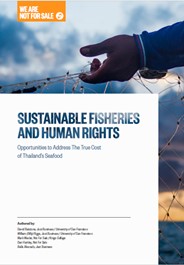The fishing industry in Thailand fell under global scrutiny in 2014 for the significant human rights violations at sea. Personal stories of victims who had worked for years at sea with little food and constant physical abuse created enough global attention that governments were forced to enact change. Yet, the fight to protect workers is ongoing, and protections are difficult because of rapidly declining fish populations. While providing aid, resources, and protections to migrants and stateless people are actions necessary to end modern-day slavery at sea, enacting and enforcing sustainable fishing practices is another necessary step in creating safe and sustainable economies for the most vulnerable. This report outlines the importance of healthy commercial fisheries to working conditions in the seafood industry, local and national economics, and food supply. It illustrates the connectivity and internationality between sustainable fishing and human rights, focusing on the connection between overfishing and the safety of workers, particularly on human rights abuses in Thailand. This provides a window into the adverse conditions in many other places where exploitive practices put human beings in jeopardy. It is a call to action for consumers around the world who purchase and enjoy seafood and have a shared responsibility in solving this crisis.

